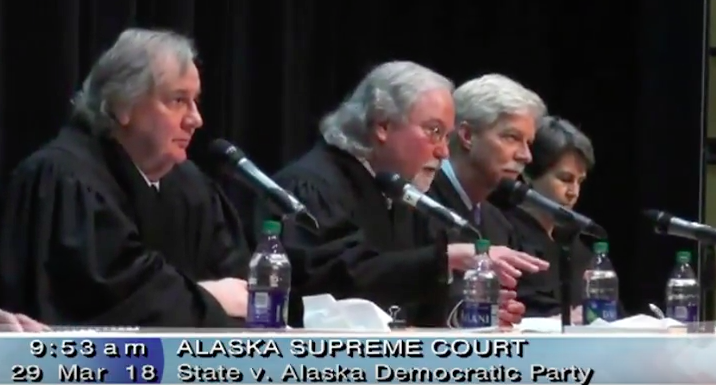ALASKA TOP COURT HEARS DEMOCRATS’ PLAN TO TURN ALASKA BLUE
Arguments in the State of Alaska vs. Alaska Democratic Party took place in Kenai on Thursday, the first time the court had met in front of an assembly of high school students at Kenai Central High.
The judges, led by Chief Justice Craig Stowers, listened to arguments about whether Democrats should be able to run unaffiliated candidates on their primary ballot.
Stowers peppered the state attorney several times during her 15-minute section, so she was not able to present her case as a logical argument.
The judges seemed impatient as state attorney Laura Fox attempted to explain that Alaska has a partisan ballot system that is organized that way for a reason, and that people who are not part of a party may participate through the petition process.
This is a question of whether or not the State actually controls the elections rather than the parties, which are private entities, controlling the actual election structure so voters are not confused.
Fox arguing for the orderly and transparent primary ballot, where Democrats and Democrats, Republicans are Republicans, Greens are Greens, Libertarians are Libertarians, and others find their own spots. There are other sideboards on eligibility, she said, (age, length of residency) and none of these presented problems or a severe burden on associational rights.
Famously, Gov. Walley Hickel, who was a Republican, joined the Alaskan Independence Party and ran under its banner, and served from 1990 to 1994. He rejoined the Republican Party toward the end of his term.
Jon Choate, the son of Juneau’s most prestigious trial attorney and Democratic Party supporter Mark Choate, represented the Alaska Democratic Party in front of the court. He argued that candidates should not have to give up their nonparty status in order to run on a party ballot.
Democrats didn’t run a candidate for governor during the last election cycle, instead supporting the unaffiliated candidate Bill Walker and his Democratic Party running mate Byron Ballot. They want to put unaffiliated people on their ballots going forward, as it has proved to be a winning ticket for them.
The questions from the judges almost ensure that Democrats are going to win this court battle and be able to put whomever they choose on their primary ballot — either registered Democrats, nonpartisans, undeclareds, unaffiliated, unaligned. Ultimately, nothing could prevent them from putting Green Party candidates on their ballots, if the logic that “anything goes” holds and the court rules that parties, not the State, are in charge.
If that’s the case, Republicans will be able to kick Reps. Gabrielle LeDoux, Paul Seaton, and Louise Stutes off their primary ballot for the same reasons — the party will have the right to say it does not want them associated with the party’s ballot. And Democrats will face the same issue in the future, when clearly non-Democrat candidates file on their ballot, and they attempt to remove them.
In essence, the party system becomes thrown into chaos, which may be the point of the Democrats seeking to upend the system that they outwitted in 2016, In doing so, they created a problem for themselves in 2018.
And if the decision goes against the State, the State will end up losing much of its constitutional right to run elections once the parties start asserting who can and who cannot be on their ballots.
Because the Division of Elections is run by Lt. Gov. Byron Mallott, Republicans will likely have to take it to court all over again to remove the rogue Republicans LeDoux, Seaton, and Stutes, and may miss this year’s election cycle.
Watch the arguments here:
